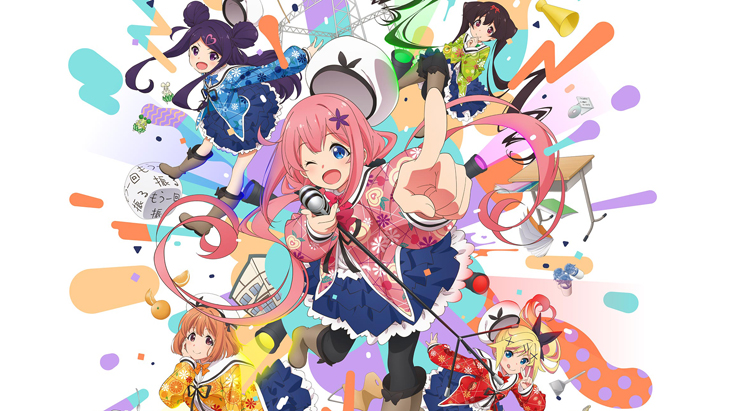
Idols have been the focus of slice-of-like series for years. The subgenre was popularized by The Idolmaster franchise and others like it such as Love Live!
Dropout Idol Fruit Tart continues the genre, introducing a cast of cute girls doing cute things which is a tried and true formula. It’s a subgenre that doesn’t leave too much room for creativity; but Dropout Idol Fruit Tart manages to take familiar clichés and make them feel fresh.
Dropout Idol Fruit Tart
Studio: EMT Squared
Publisher: Kadokawa
Director: Keiichiro Kawaguchi
Translation: Funimation
Premiere: October 12, 2020
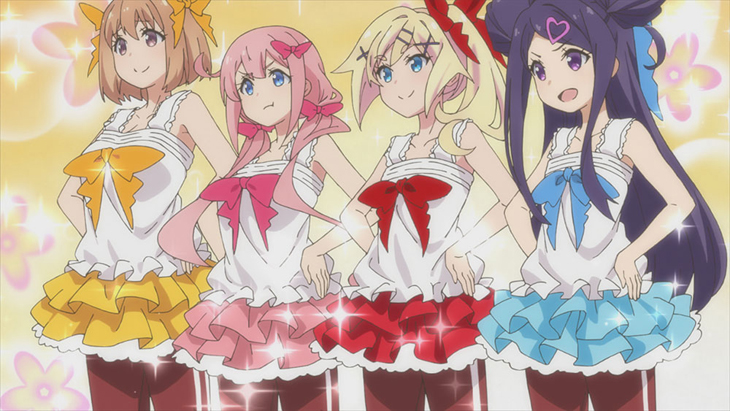
Dropout Idol Fruit Tart is the latest series from animation studio Feel; whose previous works include YU-NO: A Girl Who Chants Love at the Bound of this World, Dagashi Kashi, and Please Tell Me! Galko-chan.
The series began as a manga in 2014 by Sou Hamayumiba and is still ongoing to today. His previous work Hanamayata was made into an anime in the same year that Dropout Idol Fruit Tart premiered.
The series follows the development of aspiring idol Ino Sakura, a country girl from Okayama prefecture who has always dreamed of becoming an idol. She’s scouted by the Rat Productions talent agency and is assigned to the Mouse dormitory.
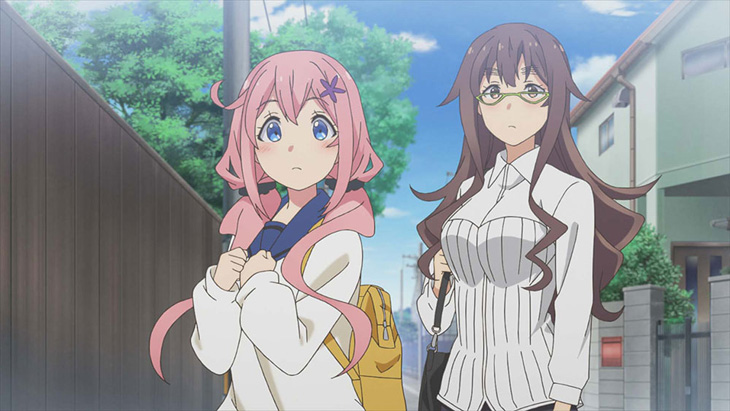
What Sakura doesn’t know, is that the Mouse dormitory is deep in the red, and manager Hoho Kajino brought on Sakura to try and reinvigorate the household into an idol group. The other girls living their include former or otherwise unpopular performers.
Roko Sekino is a former child actor who never managed to grow above 140cm tall and has a complex about it. She wants to become a serious actor but is only cast in child roles which she now balks at.
Hayu Nukui is a tomboyish musician who hasn’t had a big break yet. She’s energetic and a fan of rock music which carries through in her personality.
Nina Maehara is a former model, but her buxom physique clashes with her introverted and shy demeanor. So despite being contacted for bikini modeling she steadfastly refuses and can’t find work.
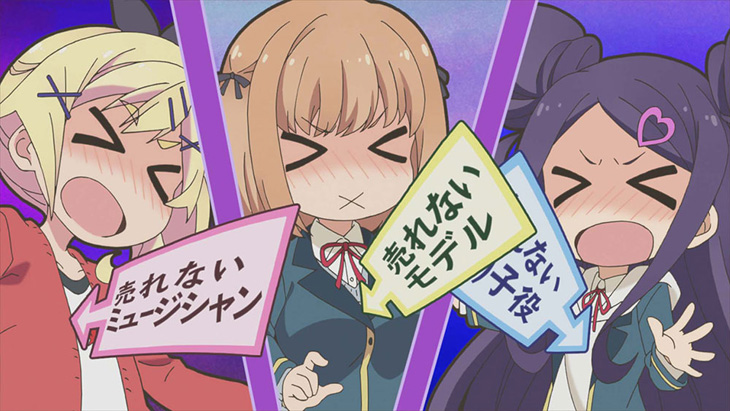
Together, the four make up the household of the Mouse dormitory with the manager Hoho Kajino who also lives there. Though the dormitory is in jeopardy as Rat Productions is deciding whether it’s worth it or not to house the talents that can’t get a break or refuse roles.
Manager Kajino’s plan is simple, with the help of Ino Sakura as a new element to the household she wants to start an idol group to do a variety show. As the idol group Fruit Tart, the flaws of the girls’ personalities will become endearing eccentricities or at least that’s the plan.
At first, the girls lack any sort of chemistry and have a hard time uniting for any kind of goal. However it’s Sakura’s cheerfulness that helps them realize that as idols, they can still share their presence with the world and cultivate a fanbase even if it’s not in their intended careers.
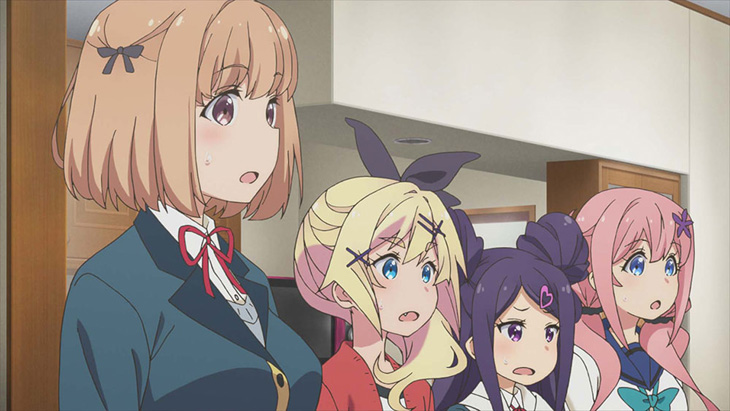
The one who has an easiest time with this is Nukui, who already wanted to be a musician so becoming an idol isn’t a drastic step. However Sekino requires the most coaxing as she fears that becoming an idol will hurt her chances of becoming a more serious actress.
Despite their misgivings, the four begin to do their best and work hard to become an idol group in order to save the Mouse dormitory. It’s a slow start for the group but they manage to persist.
Dropout Idol Fruit Tart is a happy feeling series despite the threat of debt and irrelevancy looming over the protagonists. Even rivals are friends, as we quickly learn that Riri Higashi of Cat Productions and a friend of Kajino is willing to help out when she can.
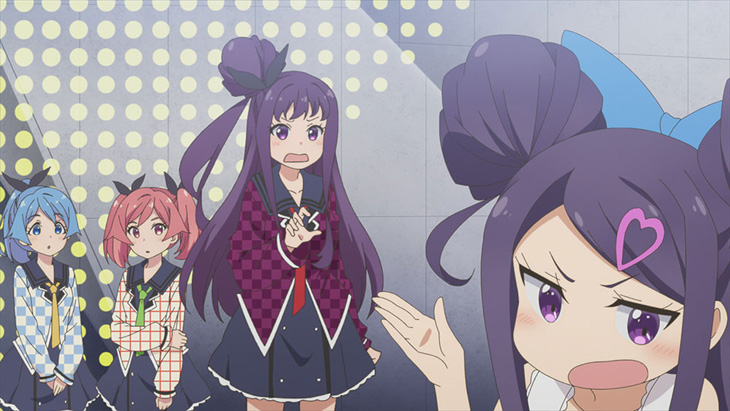
Cat Productions is the talent agency of Cream Anmitsu, an idol group of three who despite being rivals in the industry are able to get along with the budding Fruit Tart group.
Coarse personalities are also underscored by genuine earnestness. Hoho Kajino, the manager of Fruit Tart is depicted as slovenly and inept, giving the girls jobs like handing out fliers or performing a preshow in a parking lot. But these efforts are always depicted in good faith and show that even the manager is trying her hardest as it’s these sort of jobs that a new idol group needs to perform in order to get their name out there.
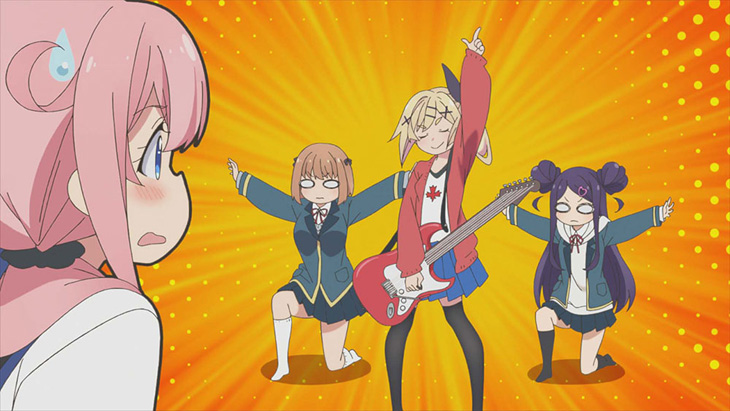
Visually, the show is covered in pastels and fanservice. In the first episode, a button snaps on Maehara’s top and constant references are made to the characters’ bust sizes and also of “Sakura’s plump legs”. So the series is unapologetic in that respect.
The visual style is more reminiscent of Doga Kobo’s Wataten!: An Angel Flew Down to Me than any of studio Feel’s previous works. The show makes heavy use of soft lines and gentle colors even in scenes like industrial parks and parking lots.
The series does rely on over exaggeration to more easily animate some dialogue scenes and some jokes will only show the main cast as triangles with a comedically large head. But frankly it’s only noticeable if you’re looking for it and the shift matches a shift in the scene’s tone.
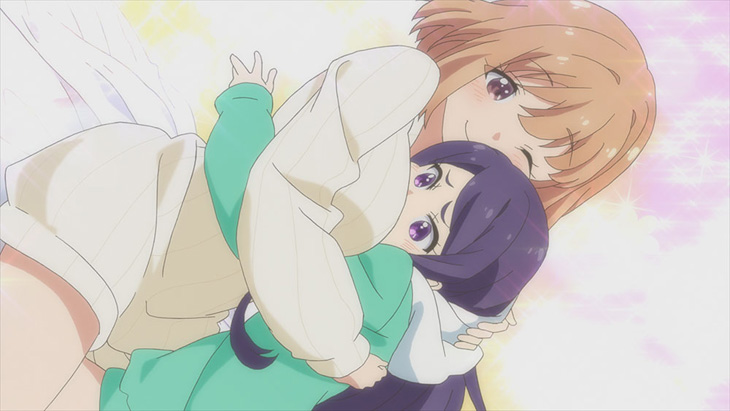
Background music is often repeated and helps set the mood for scenes, but the series excels with its opening and ending themes. The main cast performs Kibou Darake no Everyday as the opening theme, a fast paced song with a rock guitar at the intro reflecting Nukui’s influence; as well as Wonder! as the ending theme, an aspirational and more slow song than the intro, it’s still upbeat and has more of a marching tempo.
Funimation’s translation might be where the show falls short, despite being a shamelessly fanservice show it seems embarrassed of itself. There’s nothing egregiously changed like in other Funimation titles, but for instance one character comments about how Sakura wears “bear panties” (kuma pantsu) and the subtitles simply say “childish underwear”. This wasn’t a huge change, but made me wary of any other details or context that Funimation might be omitting.
A more significant complaint is the lack of translation for songs. While it’s normal for Funimation not to translate the opening and ending themes, the third episode features the girls performing their debut single and despite all the hard work the characters put into the song, English speaking viewers are left in the dark over the lyrics.
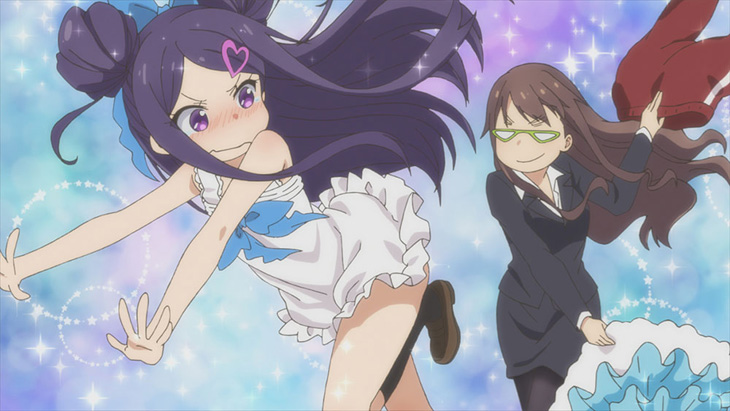
Dropout Idol Fruit Tart stands out as a comedic slice-of-life series for the Fall 2020 anime season. Older fans of the genre will find the simple premise of modern day “cute girls doing cute things” as a refreshing change of pace from the isekai and over the top comedies that make up many slice-of-life series in recent seasons and find it has more in common with the fan-service laden shows of the mid aughts.
Anyone wanting something relaxing, funny, and fan-servicey will enjoy Dropout Idol Fruit Tarts, and new anime fans wanting a more modern take of the comedies of only a decade ago will find the series to be a good introduction.
Dropout Idol Fruit Tart was reviewed via the reviewer’s anime streaming service account. You can find additional information about Niche Gamer’s review/ethics policy here.